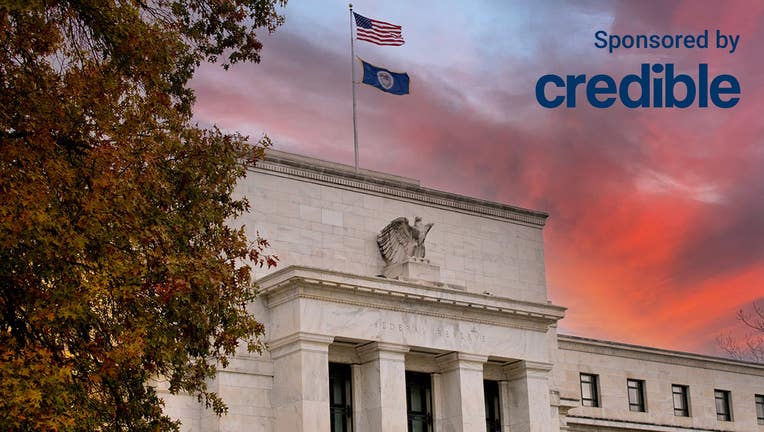Fed forges ahead with 25 basis point interest rate increase, signaling resolve to battle inflation

The Federal Reserve raised interest rates again but said its unsure whether it will need to raise them again at its next meeting in May. (iStock)
At its latest meeting, the Federal Reserve announced another 25 basis point interest rate increase and put to rest speculation about whether the storm brewing in the U.S. banking sector would cause the central bank to ease up on its monetary policy.
The rate hike brings the federal funds rate to a targeted range of 4.75% to 5%, the highest level in 15 years.
The impact of recent bank failures on the economy and consumer spending will likely determine how the Fed will proceed at future meetings.
"Since our previous FOMC meeting, economic indicators have generally come in stronger than expected, demonstrating greater momentum in economic activity and inflation," Federal Reserve Chair Jerome Powell told reporters at a press conference. "We believe, however, that events in the banking system over the past two weeks are likely to result in tighter credit conditions for households and businesses, which would, in turn, affect economic outcomes."
Until the impact is known, Powell said that the Fed might proceed with a further rate increase to reduce inflation.
"We no longer state that we anticipate that ongoing rate increases will be appropriate to quell inflation," Powell continued.
The Fed's restrictive monetary policy has been cited as a key culprit behind the recent failures of Silicon Valley Bank (SVB) and Signature Bank.
Many in the market had predicted that the Fed would raise rates by 25 basis points to show its resolve to reach a 2% inflation target rate. Any less would have signaled that the Fed was more focused on its role as the banker's bank, according to Dana Grigg, Founder of Camelotta Advisors.
"The Fed is trapped in a quandary between their ability to raise interest rates, given the banking situation, and their credibility at fighting inflation," Grigg said.
If you're looking to save money amid high inflation, you could consider refinancing your private student loans to a lower interest rate, reducing your monthly payment. Visit Credible to compare multiple student loan lenders at once and choose the one with the best interest rate for you
Household bills cost Americans 42% of their salary: Survey
Mortgage rates drop over interest rate uncertainty
Mortgage rates dropped last week because of the bank failures and their tie-in to interest rates. The average rate for a 30-year fixed-rate mortgage dropped to 6.6% for the week ending March 16, according to Freddie Mac, down from the previous week when it averaged 6.73%.
The decrease in mortgage rates has helped buoy home purchases, which have seen muted activity so far this year. Sales of existing homes increased 14.5% to an annual rate of 4.58 million homes in February, according to the National Association of Realtors.
Home prices, however, saw a minor shift, with the median prices dropping only 0.2% from the previous year to $363,000. With rates still fluctuating between 6% and 7%, affordability continues to be an issue for many homebuyers.
According to Candor's Data and Analytics department, the average first-time mortgage payment is now $2,247.95 per month, compared to $1,661.74 at the same time last year. However, the average mortgage amount rose slightly from $330,000 to $336,000.
"The higher payment is due to the Fed's insistence on keeping the cost of lending artificially high," Thomas Showalter, CEO of Candor Technologies, said. "The Fed's actions to raise interest rates continue to hamper the ability of both the trillion-dollar mortgage industry to operate and the average household to afford to buy a house."
If you are interested in taking advantage of lower mortgage rates, you could consider refinancing your loan to lower your monthly payment. Visit Credible to find your personalized interest rate without affecting your credit score.
Retirement plan balances decreased by nearly 25% in 2022
Disinflation is still happening, Fed says
Powell told reporters at the press conference that disinflation is still happening but said that the road to getting inflation back down to 2 percent still had a long way to go and was "likely to be bumpy."
February's Consumer Price Index (CPI), a measure of inflation, came in at 6%, showing that inflation is moderating since hitting a record high last June. However, Powell noted that the strength of CPI readings this year shows that inflation pressures continue to run high.
"The fact that the Federal Reserve has decided to once again raise rates, albeit only 25-basis points, serves as further evidence that despite the consideration warranted to other real-time financial developments, and some positive signs in recent inflation reports, the Fed believes work remains to be done," Michele Raneri, TransUnion's vice president and head of U.S. research and consulting, said.
For consumers, that means even higher borrowing costs, particularly in industries such as mortgage and credit cards, Raneri said.
"In this high-interest rate environment, consumers are advised to continue paying down as much higher interest debt as they can, continue paying bills on time and work to keep their personal financial and credit profiles as strong as they can be," Raneri continued.
If you are struggling amid high inflation, you could consider taking out a personal loan to help pay down debt at a lower interest rate, lowering your monthly expenses. Contact Credible to speak to a loan expert without affecting your credit score.
Most Americans support Biden's student loan forgiveness plan, survey says
Have a finance-related question, but don't know who to ask? Email The Credible Money Expert at moneyexpert@credible.com and your question might be answered by Credible in our Money Expert column.

